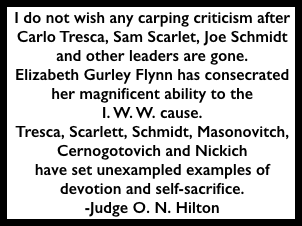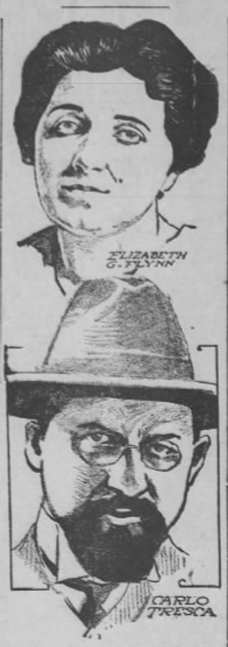
Hellraisers Journal, Friday July 6, 1917
Duluth, Minnesota – Miss Flynn “Expelled” from I. W. W.
From the Pittsburgh Daily Post of July 1, 1917:
Note: the information below comes via the Duluth Police Department, and not directly from Elizabeth Gurley Flynn.
I. W. W. President Expels
Miss Flynn
—–
DULUTH, Minn., June 30.-Elizabeth Gurley Flynn of New York told Duluth police, before departing for her home, that William Haywood, Chicago, president [General Secretary-Treasurer] of the Industrial Workers of the World, had expelled her from the organization. Miss Flynn, according to the police, said Haywood and his advisors charged she conspired with Carl [Carlo] Tresca, Haywood’s former lieutenant, to “double cross” four industrial workers who received penitentiary sentences recently on a murder charge, in connection with labor troubles.
Miss Flynn exhibited a manuscript which was to have been her speech at Virginia, Minn., last Sunday. In it she made pleas against stories at the mines during the war, and this address, she said, was in conflict with Haywood’s plans. It was Miss Flynn’s story that brought about her release from charges of vagrancy Thursday, the police said today.
———-
[Photograph added]
SOURCE
Pittsburgh Daily Post
(Pittsburgh, Pennsylvania)
-July 1, 1917
https://www.newspapers.com/image/87692365/
IMAGE
EGF, Tresca, MN Iron Miners Strike, Ev IN, Aug 17, 1916
https://www.newspapers.com/image/139947620/
See also:
Note: The Duluth police are the source for this article, not EGF herself. Big Bill Haywood was not the President of the IWW; the head officer of the IWW is entitled “General Secretary-Treasurer.” Furthermore, he did not “expel” EGF from the IWW; he had no authority under the IWW constitution to simply issue such an order to expel any member. However, he did fire her as a paid national organizer. Exactly when she was fired, I have been unable to determine, more research needed.
General Secretary-Treasurers of the IWW
https://iww.org/headquarters/oldgst
The Evolving I. W. W. Constitution
http://www.workerseducation.org/crutch/constitutions.html
Note: Haywood blamed Flynn, Ettor and Tresca for the settlement of the court cases which resulted in the imprisonment of the three Mesabi strikers. However, this was grossly unfair. The plea deal was in the hands of the attorneys, most notably, O. N. Hilton, and of course, the defendants themsleves.
Tag: Minnesota Iron Miners Strike of 1916
See Esp: Hellraisers Journal: Judge Hilton Defends Plea Deal in Mesabi Cases, Lauds IWW Men and Praise Elizabeth Gurley Flynn
For more on Conflict between EGF and Big Bill Haywood:
In The Rebel Girl, EGF addressed the conflict with Big Bill Haywood following the settlement of the Minnesota Iron Miners Strike of 1916:
In late December 1916 the lawyers called us to Duluth for a conference. They arranged it in a large room in the courthouse, with all the defendants present. We knew they had been holding pre-trial conferences with the state’s attorney but their proposal was a complete surprise to all of us. It was that three of the four Montenegrin defendants should plead guilty to manslaughter and serve one to three years; the woman and one of the workers were to be dismissed unconditional and the three [IWW] organizers [Joe Schmidt, Sam Scarlett and Carlo Tresca] were to be set free without trial. “you mean my wife will not go to prison?” Phillip Masonovich asked incredulously and with great joy. He shook hands with Tresca and patted him on the back, saying: “Carlo, you go out and do more good work.” Each of the four insisted another go out and he remain. It was left to them to decide who was to be freed. It was left to them to decide who was to freed. It was not strange that they so readily greeted the idea with satisfaction since they had resigned themselves to the fate of life imprisonment for all concerned…
If the proposal was rejected they would proceed to try the Montenegrin workers first and felt sure they could get a verdict of guilty from a handpicked, English-speaking, middle-class jury in that area. We had no illusions on this score. We knew they could..The defendants discussed it alone and decided to accept. All present concurred. It was a Solomon’s decision. We all believed we were doing the very best for all concerned. …
The next day in court the judge sentenced the three workers to five to twenty years for manslaughter. The organizers protested: “This was not the agreement.” We were stunned…
Haywood blasted us publicly without even waiting or our explanations, which complicated the problem [of seeking parole for the prisoners]. We put some money in a local relief fund for Mrs. Masonovich and her family for one year and $2000 in a trust fund to carry on further legal efforts for their release, and for further relief to the family if necessary. We sent a lawyer before the parole board twice.
Considering that it was wartime, with ferocious attacks then being made on the IWW, plus our later arrests…, it was a great relief to all of us concerned when these heroic workers were finally freed, just a little over three years after their imprisonment. The whole episode terminated the official relations of Ettor and Tresca with the IWW. I stuck for a while longer, determined to prove to my fellow-workers that my loyalty and devotion could not be shaken by my relations with Haywood…
On page 226 of Rebel Girl, EGF describes her last visit to IWW HQ. This would most likely have been sometime in May of 1917:
On my way home from Seattle, I stopped at Chicago and visited the IWW headquarters. This was the last time I was there. I remarked at an informal meeting with editors and others that I thought certain IWW pamphlets should be revised and some should be taken out of circulation..I had seen in Seattle how they could be used in trials against our members and I said I was going to request the general executive board not to reprint my pamphlet on “sabotage.”
…”Why put ammunition in the hands of the enemy?” I asked. After the discussion, Haywood, in an unfriendly tone, said: “What’s the matter, Gurley? Are you losing your nerve?” He ordered a new edition printed with a lurid cover, designed by Ralph Chaplin, of black cats and wooden shoes. But the executive board stepped in an ordered that it should not be published.
Mary Heaton Vorse came to the Range during the 1916 strike as a reporter and later described the conflict between Haywood and the organizers who were on the ground up on the Mesabi:
The strike was going badly. With the arrest of the leaders and the steady terrorization, the workers had become discouraged. The strike was shorthanded. Elizabeth Flynn and a few remaining I.W.W. leaders went from one end of the Range to the other. Added to this, Haywood, who never came to the Range at all, was critical of everything that was done. The strike funds were irregular in coming. The I.W.W. was going through a period of centralization. Funds, instead of being sent to the strike direct, were sent to Chicago. Twice, Elizabeth Flynn had to go down to straighten things out. The disputes with Haywood, and the actual strike leaders, led to Elizabeth flynn and Carlo Tresca withdrawing from the I.W.W. after the strike.
SOURCES
The Rebel Girl:
An Autobiography, My First Life (1906-1926)
-by Elizabeth Gurley Flynn
(Pages 215-16, and pages 226-27)
International Publishers, 1973
https://books.google.com/books?id=BhRBMQAACAAJ
Can be read online, see link below:
(Scroll down to page 212: “A Solomon’s Decision”)
(See also page 226: “Arrested for Vagrancy”)
https://libcom.org/history/rebel-girl-autobiography-my-first-life-1906-26
A Footnote to Folly:
Reminiscences of Mary Heaton Vorse
Farrar & Rinehart, 1935
(Chapter IX: Mesabe Range)
(search:carlo tresca withdrawing)
https://books.google.com/books?id=G7tiAAAAMAAJ
For Haywood’s account of these events:
Bill Haywood’s Book
The Autobiography of William D. Haywood
-by Big Bill Haywood
International Publishers, 1929
https://catalog.hathitrust.org/Record/000859708
See page 291:
https://babel.hathitrust.org/cgi/pt?num=291&u=1&seq=7&view=image&size=100&id=mdp.39015050276461
Dedicated to Elizabeth Gurley Flynn and Mary Heaton Vorse
who fearlessly faced the deputized company gunthugs
during the 1916 strike on Minnesota’s Mesabi Iron Range:

